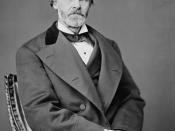Young 1
PLA 3436
April 24th 2014
The History of White Collar Crime
Corruption may be old, but the theories that shape how we think about it are still new. The FBI defines white collar crime as:" Illegal acts which are characterized by deceit, concealment, or violation of trust and which are not dependent upon the application or threat of force or violence. Individuals and organizations commit these acts to obtain money, property, or services, to avoid the payment or loss of money or to secure personal or business advantage. There have been debates as to what qualifies as a white collar crime." The National White Collar Crime Center defines white collar crime as "illegal or unethical acts that violate fiduciary responsibility or public trust for personal or organizational gain." The term today encompasses a variety of nonviolent crimes usually committed in commercial situations for financial gain. White-collar crimes are not of a great concern to the public mind as compared to other types of crime.
In term of money however, white-collar crimes are even more consequential for society. A total of three hundred billion dollars estimated annually.
The earliest documented case of white collar crime law was in England for embezzlement and therefore creating the first law of its type in 1473 to prevent these situations. These types of crime were not given their defined name, white collar crime until a speech was given to the American Sociological Society in 1939 by Edwin Hardin Sutherland. The point of his infamous speech was to have others see how law enforcement focuses on of the lower classes and the crimes they commit, but continually looked over any action of the upper class, especially in business. The popularity of these types of crimes would not rise and be paid attention to until...


